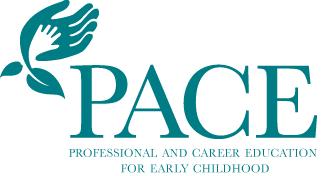
140 Orientation
In this orientation session participants will learn how the PACE Program works and the requirements for converting PACE workshops to credit. The first assignment is explained and when textbooks are available to borrow, participants can pick them up at the orientation.
Section - Coming in the future
140 Values and Practices
In this workshop you explore the ways that personal values relate to your work and children. The workshop examines long and short range goals and offers an opportunity to clarify how what we value can be translated through the work we do. Outcome: Use guidance strategies to promote the development of self-control and prosocial behaviors.
Section - Coming in the future
140 Developing a Philosophy of Guidance
This workshop offers you opportunities to explore your personal guidance philosophy and to examine the relationship between beliefs and practices. Outcome: Use guidance strategies to promote the development of self-control and prosocial behaviors.
Section - Coming in the future
140 Respecting Diversity
We work closely with children and families from many cultures and from a multitude of backgrounds. Come learn about the ways that family values impact on guidance practices. Outcome: Use guidance strategies to promote the development of self-control and prosocial behaviors.
Section - Coming in the future
140 Values and Beliefs Capstone
At this workshop, you share your assignments with other participants, review the ideas and skills covered in the unit, take the knowledge assessment, and turn in your assignment. Outcome: Identify a broad range of positive guidance strategies to build respectful relationships with children.
Section - Coming in the future
140 The Nurturing Verbal Environment
Learn to use reflective and responsive statements (R & R), open-ended questions, and words of encouragement to promote a positive and nurturing verbal environment. Outcome: Use guidance strategies to promote the development of self-control and prosocial behaviors.
Section - Coming in the future
140 Effective Listening
You listen to people all of the time, but do you really hear what they mean to tell you? This workshop offers an opportunity to expand your listening skills and to use these skills when communicating with children. Outcome: Use guidance strategies to promote the development of self-control and prosocial behaviors.
Section - Coming in the future
140 Positive Communication
The communication style you use can make a significant difference in your relationships. Learn some positive and productive ways to get your messages across to both children and adults. Outcome: Use guidance strategies to promote the development of self-control and prosocial behaviors.
Section - Coming in the future
140 Building Relationships Capstone
At this workshop, you share your assignments with other participants, review the ideas and skills covered in the unit, take the knowledge assessment, and turn in your assignment. Outcome: Identify a broad range of positive guidance strategies to build respectful relationships with children.
Section - Coming in the future
140 Learning to Cooperate
Learn to promote pro-social behaviors by setting appropriate guidelines, avoiding competition, learn strategies for room arrangement, selection of materials, schedules, routines, and adult/child interactions which foster cooperation. Outcome: Use guidance strategies to promote the development of self-control and prosocial behaviors.
Section - Coming in the future
140 Learning to Negotiate
Successful adults are those with highly developed problem solving skills. This workshop gives you the tools to assist children to develop this important skill. Outcome: Identify a broad range of positive guidance strategies to build respectful relationships with children.
Section - Coming in the future
140 Limit Setting Strategies
Learn about natural and logical consequences (both appropriate and inappropriate), choices, and contingencies to help children learn to self-regulate themselves. Also, practice using these strategies with real-life examples of antisocial behavior. Outcome: Identify a broad range of positive guidance strategies to build respectful relationships with children.
Section - Coming in the future
140 Building Cooperation Capstone
At this workshop, you share insights from your assignment, review the ideas and skills covered in the unit, take the knowledge assessment, and turn in your assignment. Outcome: Identify a broad range of positive guidance strategies to build respectful relationships with children.
Section - Coming in the future
140 Understanding Children’s Behavior
This workshop focuses on infant to school-age (ages 5-8 yrs.) social/emotional development and appropriate practices for each stage. Outcome: Identify a broad range of positive guidance strategies to build respectful relationships with children.
Section - Coming in the future
140 Punishment Versus Discipline
Learn the difference between punishment and discipline (positive child guidance), review what NAEYC and Head Start say about time-out, and explore specific adult interaction strategies and evaluate if it is discipline or if it is punishment. Outcome: Use
Section - Coming in the future
140 Challenging Behaviors
Identify some of the feelings behind the buttons pushed by the difficult or challenging behaviors in young children. Also, learn strategies and practice creating a plan for the challenging behaviors of a particular child. Outcome: Use guidance strategies to promote the development of self-control and prosocial behaviors.
Section - Coming in the future
140 Effective Discipline Capstone
At this workshop, you share your assignment with other participants, review the ideas and skills covered in the unit, take the knowledge assessment, and turn in your assignment. Outcome: Outcome: Use guidance strategies to promote the development of self-control and prosocial behaviors.
